The Google Pixel C Review
by Brandon Chester & Joshua Ho on January 25, 2016 8:00 AM ESTBattery Life
When Apple unveiled the iPad, they promised that it would achieve 10 hour battery life. That has been something of a standard for tablets now, and for the most part we've seen that high end tablets end up meeting that goal, while mid range ones often end up falling short of it. 2015 was a bit of an exception to this in some ways, with many high end tablets also missing this goal by several hours in some cases. Due to the nature of tablets and how they're used, it's really difficult to recommend one if it doesn't achieve enough battery life to last you through the day with a normal workload.
To test the Pixel C's battery life I've attempted to run it through all of our battery tests. First up is our internal web browser test, followed by our video playback battery test.
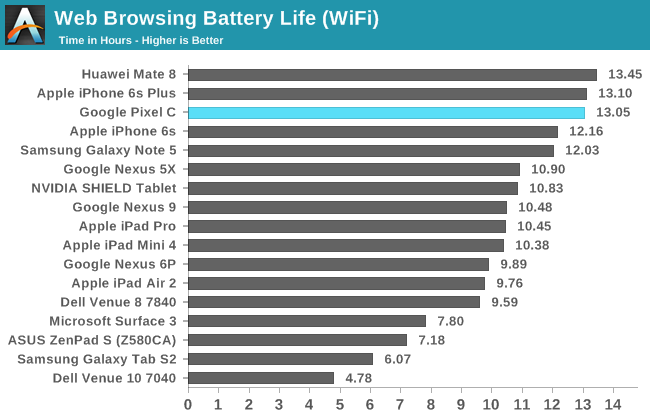
It's clear that Google's use of a LTPS display and a large battery pay off big time when you look at battery life. Even with the SoC staying on its higher-power A57 cores, the Pixel C manages to last for over 13 hours in our web browsing test. This puts it ahead of every other tablet on record, and by a large margin too.
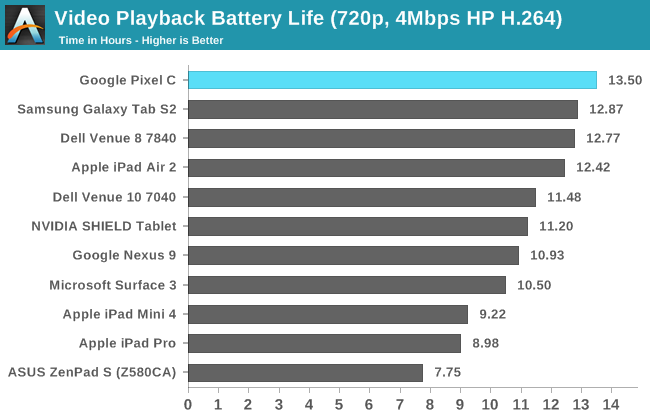
In video playback the Pixel C once again comes out on top. This is quite surprising, as normally AMOLED tablets perform best in this test due to their ability to turn off pixels when displaying black, as well as their general efficiencies with darker colors and shades. The gap between the Pixel C and the Tab S2 isn't insignificant either, so Google should be very happy with what they've achieved here.
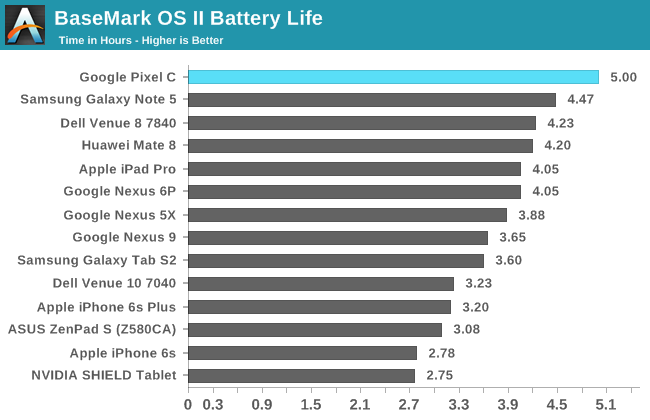
In BaseMark OS II's CPU-bound battery test we again see the Pixel C top the charts. This is really surprising to me, because on the SoC side we're looking at four Cortex A57 cores on a 20nm process. Again, Google's large battery and LTPS display help a great deal, but it's also clear that Tegra X1 isn't causing any significant problems for the Pixel C as far as power consumption goes.
At this point I would normally continue to run our PCMark and GFXBench battery tests. Unfortunately, the Pixel C's software makes it incapable of completing either of them. I made five attempts to complete PCMark, which took a great deal of time as the test runs over many hours. In all cases the tablet locked up during the test and required a hard reboot. It may be possible to eventually get it to complete, but I didn't feel that it was worth delaying the review further in the hopes that I could eventually get the Pixel C to complete the test properly.
As for GFXBench, it instantly stops due to it detecting that the tablet is plugged in. I believe this may relate to Google's system for inductive keyboard charging, but whatever the cause may be the result is that I can't get a battery result for GPU-bound workloads either. It's worth noting that the web test also required several runs before I could get it to complete the test without the tablet crashing, so that's something to think about as far as software stability and reliability goes.
In the end, what I have seen of the Pixel C's battery life leads me to believe that it's quite good, but we're definitely not looking at the entire picture here due to the missing data. I can say that in my experience it seemed to last a long time, so if I had to go out on a limb I would say that the combination of the low power LTPS display panel and a relatively large battery allow for very good battery life even with the CPU running on its A57 cores. Since Tegra X1 has a great deal of GPU power I really wish I could have gotten a GFXBench battery result, but there's not much that can be done there.
Charging
Since tablets usually offer enough battery life to get through the day, being able to charge them incredibly quickly becomes less of a need than with smartphones because you'll often end up only charging your tablet overnight. That being said, the immense charge time required by older tablets which required larger batteries to power their SoCs and displays meant that if your tablet battery did die you probably weren't going to get to use it until the next day. With modern tablets we've seen a push to reduce battery capacity, as well as the inclusion of 10-15W chargers to reduce charge times.
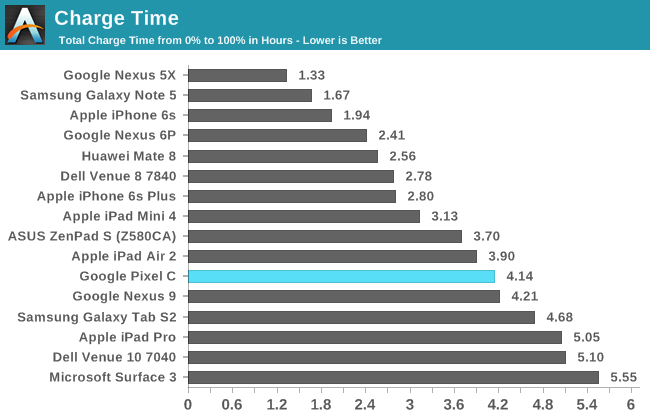
The Pixel C ships with a 15W charger with a USB Type-C connector. The cable is actually fixed to the block, so you can't use it as a normal Type-C to Type-C cable. On the bright side, Google has used a cable which is around four feet long, so you get some extra length compared to using the included cable in the box. As you can see in the graph above, the battery is charged at around 11W while fast charging, which lasts for three hours before trickle charging begins. Getting the remaining 10-15% ends up taking another hour, with the total charge time from 0% to 100% being 4.14 hours. Considering that the Pixel C packs a noticeably larger battery than the iPad Air 2, the roughly four hour charge time is actually quite a good result.


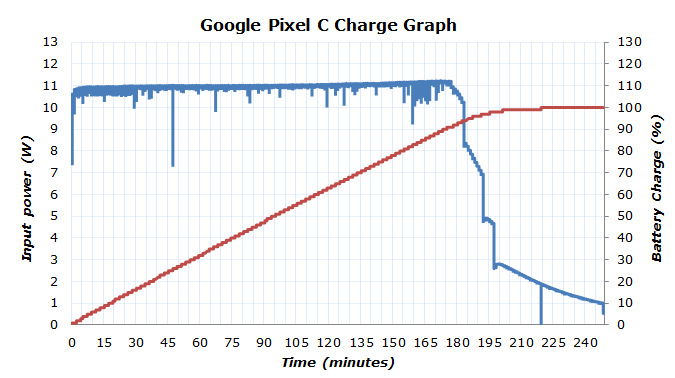








122 Comments
View All Comments
Alexey291 - Saturday, January 30, 2016 - link
I don't honestly know if I agree. I mean i've heard this myth a lot sure. And yes some apps suck for a tablet in android. On the other hand I only really watch movies, mess around with photos and play games on a tablet.On a rare occasion I also check on work emails and what not.
I'm sorry but I haven't had a problem doing any of those.
mmrezaie - Monday, January 25, 2016 - link
Even my Nexus 5X is having numerous problems. It gets slow when I push it by taking three pictures in a minute, or when all of sudden I go from email app to google map. It is in a sad state.Maxpower2727 - Monday, January 25, 2016 - link
Interesting. My Nexus 5x has no such issues.grayson_carr - Thursday, January 28, 2016 - link
Mine doesn't either. He probably doesn't even have a Nexus 5X.hans_ober - Monday, January 25, 2016 - link
Throttling graphs? Power measurements?JoshHo - Monday, January 25, 2016 - link
These weren't possible because the units crashed or otherwise exhibited behavior that made it impossible to do proper testing.testbug00 - Tuesday, January 26, 2016 - link
Ah, got to love how well Nvidia designs it's SoCs. You cannot use the small cluster, although I think their devboars might, and likely they cause the other problems in measurement.Ask Intel if they can tear into the Pixel C and try to isolate power numbers like they did long ago?
osxandwindows - Monday, January 25, 2016 - link
This can't compete with the iPad pro or surface.There are no tablet apps for android, simple as that.
Sorry, google.
But android is not really meant for tablets.
Its more meant for phones.
osxandwindows - Monday, January 25, 2016 - link
Look at samsung, for example.They gave up on android and went with windows.
Maxpower2727 - Monday, January 25, 2016 - link
Is that why they're still making so many Android tablets?